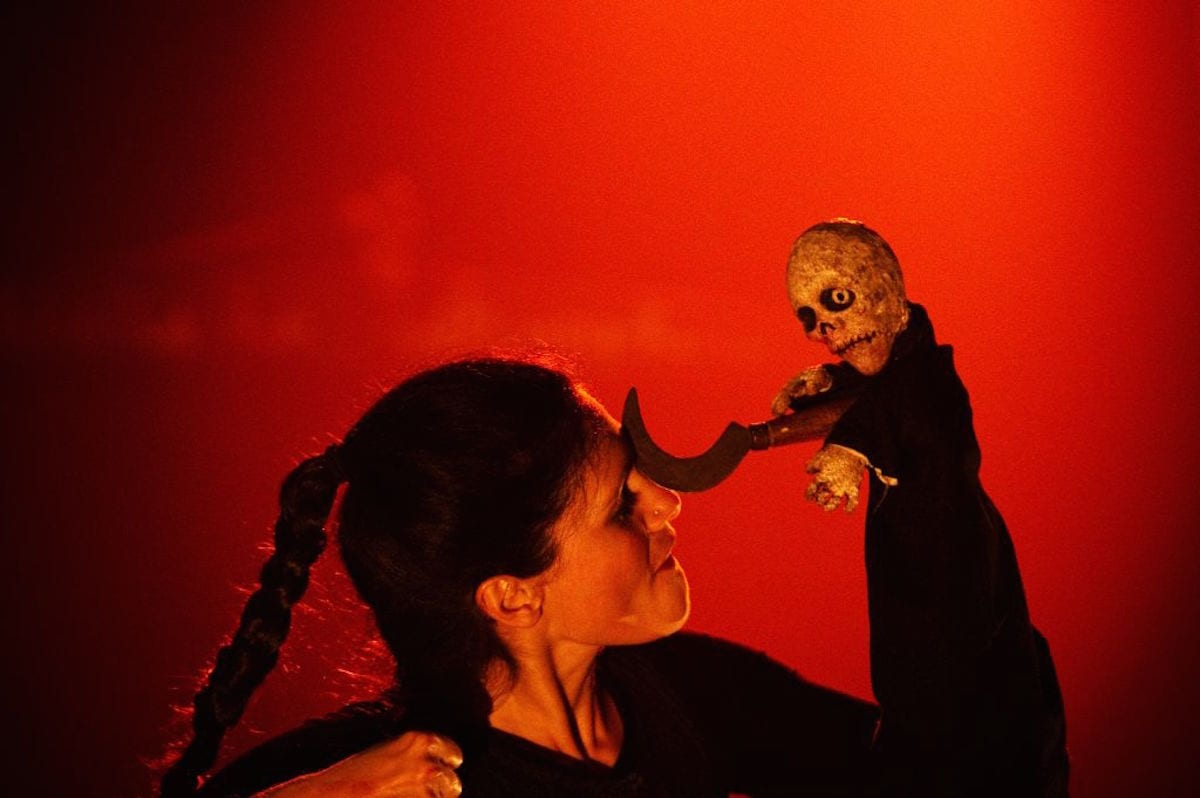“Life is like a succession of births.” Tria Fata tells the story of a woman visited by “Mrs. Death.” Not yet ready to go, she hands Mrs. Death one of her legs, requesting a little time for her life to flash before her eyes before it’s over. Tria Fata uses bunraku puppets, shadow puppetry, and a dabbling of physical performance with occasional mask-work, supported by a one man band. It’s a sweet, dark, and quirky tale that lets the protagonist live a not-too-remarkable life while getting remarkably surreal with the details.
Its reminiscing sequences have to do with transitions in life: birth, separating from home (running from a castle and a commanding hand), falling in love (with a lover swirling around her like an airplane), and traveling. Eventually in a kind of manipulated picture-book format, images of the Colosseum, a cactus, and an oriental print coalesce into a beach with a lone wooden chair as frame by frame, the tide comes in, engulfing it, until it becomes an image of a child suckling a tit. Her career as a midwife, she explains, comes from her need to hold life, and from an obsession with birth of self.
One of its most memorable sequences is a surprising and darkly comical birth. Her mother, alone, goes into labor. She opens a bag and assembles what appears to be an electric carving knife. Then she prays – “in the name of the father (who is missing)…” – and, the knife’s motor whirring, cuts herself open and pulls out the baby. The baby comes out and starts speaking, saying she’s here to be the superstar of the show. She tries to resuscitate her mother, then opens her shirt and starts sucking her breasts. Then she bounces on her mother’s belly in slow motion while still connected to the umbilical cord. She tries to use the electric carving knife to cut it, but she falls off the table. Her mother wakes up, staples her stomach closed (saying “it tickles!”), pulls the baby back up with her umbilical cord, hugs it, and then wishes it luck. She bites her umbilical cord, then starts trying to pull it out, then – thankfully – scissors drop from the sky and she severs it.
Tria Fata’s least effective moments seemed to happen when it stepped from puppetry into physical performance. Unnecessary finger-pointing and inexact gestures drain some life from the show. At one point, the screen that generally translates for us reads, simply, “a love poem.” Estelle, now playing the show’s protagonist, delivers a poem in French to the one man band at stage left. It’s nice, but it’s lacking, like something failed to connect. Maybe it’s delivered in the wrong direction and we need to see her eyes. Maybe there was a disconnect in affect between the two performers. Maybe I just needed to understand the words better. The moment didn’t land for me.
As quirky as it is, Tria Fata has the workings of wisdom in it. It appears to be a show about becoming ready to die, sprinkled with just enough little truths to keep a magical connection to The Three Fates, to some sorts of strings being pulled and pushed in the background, as if this smorgasbord of puppets holds a sad, mysterious, slightly warped key to understanding life and its end.

